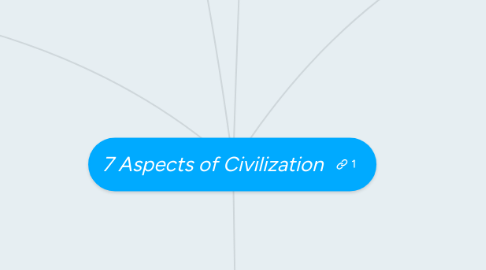
1. Religion
1.1. Sumerians
1.1.1. Sumerians practiced Polytheism (the worship of many gods)
1.1.2. Sumerians worked hard to please the gods
1.1.3. Built temples and ziggurats where priests and priestesses offerred the gods food and drink and held ceremonies
1.1.4. Many of the city-states created dynasties which were a series of rulers from one family
1.2. Shang/Zhou
1.2.1. Most Shang tombs contained valuable items made of bronze and jade
1.2.2. Used oracle bones in ceremonies where they asked their ancestors for advice
1.2.3. Shang religon centered around ancestor worship by offering gifts to keep them happy in their afterlife
1.2.4. Hundreds of prisoners were sacrificed to the ruler, proving that the Shang believed in an afterlife where their ruler would still need servants and riches
2. Arts and Education
2.1. Sumerians
2.1.1. Sumerians sculptures includes statues with large, Wide-open eyes, smalls things carved out of ivory
2.1.2. Sumerians most famous works of art are its cylinder seals
2.1.3. Sumerians architecture include the use of arches, ramps, and columns
2.1.4. Many of the Sumerians artifacts and ruins remain
2.2. Shang/Zhou
2.2.1. Taught two different beliefs: Confucianism and daoism
2.2.2. Confucianism was the belief that all people should treat others humanely with love and respect
2.2.3. Daoism was the belief that you should retreat the laws of society and go with nature, for humans to have a healthy relationship with the universe
2.2.4. Confucianism was created by Confucius. Daoism was believed to be started by Laozi
3. Geography and Agriculture
3.1. Sumerians
3.1.1. Dug basins to store water, canals to carry water and dikes to control floods
3.1.2. Fertile crescent: large band of fertile land forming an oasis in deserts and moutains
3.1.3. Land well suited for agriculture
3.1.4. Between the Tigris and the Euphrates rivers, is some of the richest soil (aka Mesopotamia)
3.1.5. This area recieved little rain so it depended on snow melt in nearby moutains
3.2. Shang/Zhou
3.2.1. People started growing crop 9,000 years ago in Huang He Valley
3.2.2. Had rivers for irrigation and fertile soil for growing plants
3.2.3. Much of China is covered in mountains, deserts, and hills to protects them from invasion
3.2.4. Southern China in warm and receives lots of rainfall so it is good for growing rice
4. Science and Technology
4.1. Sumerians
4.1.1. Developed a math based system on the number 60
4.1.2. Used geometry to build irragation systems and elaborate structures
4.1.3. Developed things such as the wheel, and sewers
4.1.4. Had many medical advances, even performed basic surgeries
4.2. Shang/Zhou
4.2.1. Learned to use iron which was stronger and cheaper than bronze
4.2.2. now had the ability to have iron weapons which strengthened their army
4.2.3. Population growth led to the creation of roads and canals all throughout China
4.2.4. Zhou introduced coins and the use of chopsticks to China
5. Government and Leaders
5.1. Sumerians
5.1.1. Priests held the highest status
5.1.2. War chiefs began to rule as kings
5.1.3. In many of the city states, kings formed dynasties
5.1.4. Sumerians worked hard to please their gods who were there overall leaders
5.2. Shang/Zhou
5.2.1. Ruined by a Monarchy
5.2.2. Kings were surrounded by a court that did rituals that kept the kingdom safe
5.2.3. King appointed governors to rule distant parts of the kingdom
5.2.4. King had a large army that was in charge of preventing rebellions
6. Social Structure and Family Life
6.1. Sumerians
6.1.1. Obtained many of their materials through trade
6.1.2. Men and women had distinct roles
6.1.3. Men were political and made laws
6.1.4. Women took care of the home and family
6.2. Shang/Zhou
6.2.1. Peasants barely made it with the little they were provided with from the king's taxes
6.2.2. Warriors were very powerful at this time
6.2.3. Overtime, the king lost a great deal of power to high aristocrats
6.2.4. Kings and Nobles were at the top of the social ladder
7. Economy and Trade
7.1. Sumerians
7.1.1. Get materials for building and arts through trade
7.1.2. Lacked materials such as wood and metals
7.1.3. Traded with people across Southwest Asia, exchanging woven textiles, timber, and stone
7.1.4. As trade increased, a social hierarchy formed in the society
7.1.5. Men and women had distinct roles
7.2. Shang/Zhou
7.2.1. Created one of the first systems of money
7.2.2. Farmers learned new techniques that helped them to produce more than enough crops, creating food surpluses
7.2.3. Learned how to use iron which could be cast more cheaply and quicker than bronze
7.2.4. Cities grew because populations were increasing which led to the building of roads and canals
